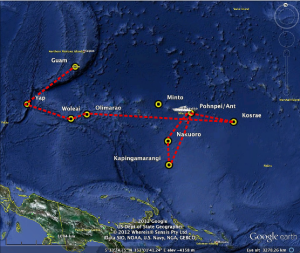The sound of the engines on the ship drones on as we transit north to Pohnpei, our last destination on this expedition, and I am pondering all that we have seen on this trip thus far. In the past few days, we had the unique opportunity to survey reefs fringing islands inhabited by very few people. Not only are these reefs the healthiest the disease team has ever seen, they are teeming with fish, and apex predators patrol the deeper blue. Interestingly, the atolls with the healthiest reefs are those nearest the equator, where sea surface temperatures are higher than at Kosrae, for example, yet these corals exhibit very few signs of disease, if any.
On these reefs, every nook and cranny is occupied by a widely diverse group of corals of all sizes from the smallest nubbins to great big boulders. My job has been to count each coral colony, square meter-by-square meter, and classify them by genus and size. Others on the team are looking for signs of coral disease, counting fish and determining hard coral cover percentage along our two 25-meter transects per site. One observation suggests that human population size correlates with reef health in Micronesia. Although a number of factors could explain this including land-use and run-off, fishing effort may also be relevant. Herbivorous fish graze algae that colonize newly exposed coral skeleton when the coral experiences tissue loss (whether from disease or predation). This grazing is a fundamental service that benefits the corals as they are able to slowly grow over exposed skeleton but only if the fast-growing algae is not present. Both algae and coral live in a constant battle for reef real estate and fish act as agents for the slow-growing coral, effectively keeping the skeleton clean until coral tissue can grow back or other coral species colonize. Overfishing of these important reef grazers could have important impacts on the health of the coral reef.
It has been an amazing experience to be able to see coral reefs as they should be in the absence of the numerous pressures common to the reefs of more populated regions. All of the reefs we've surveyed in Micronesia look relatively healthy. One of the benefits of surveying reefs such as these is the ability to compare them to highly impacted reefs elsewhere in the Pacific. This research can help us understand the problems and therefore find solutions before it is too late.



0 comments:
Post a Comment